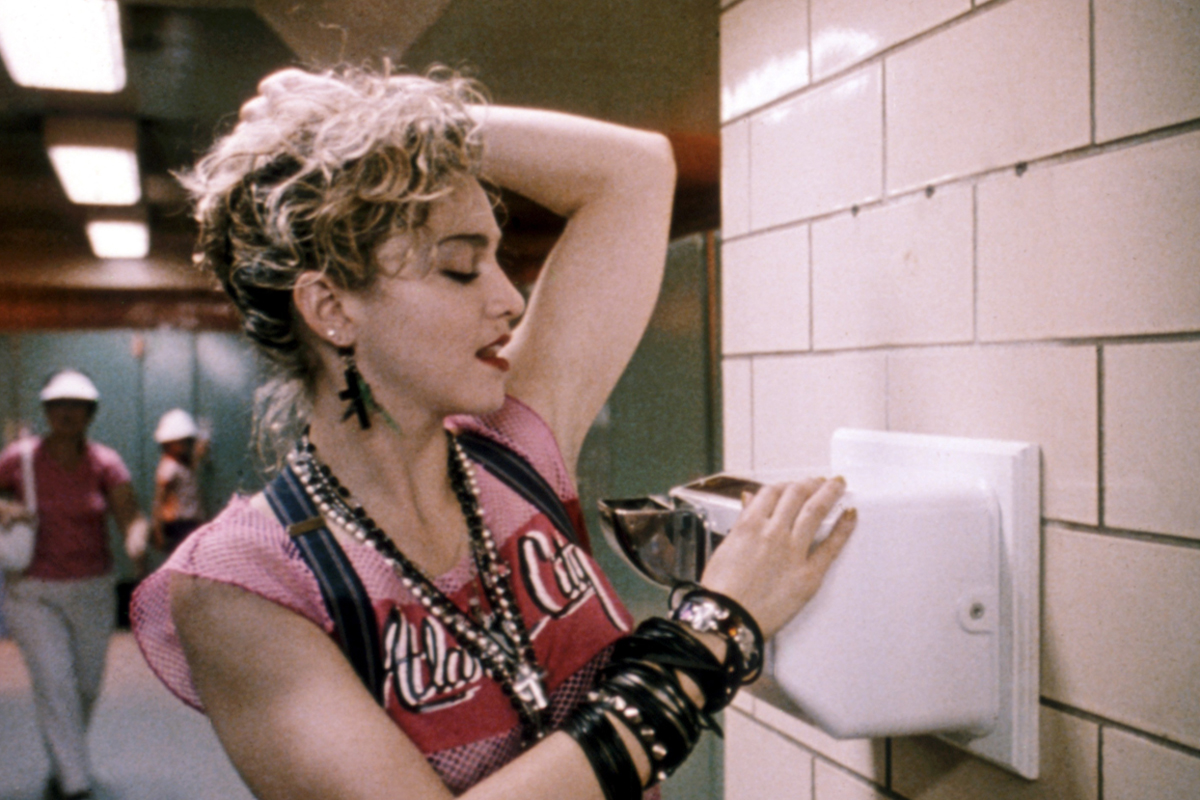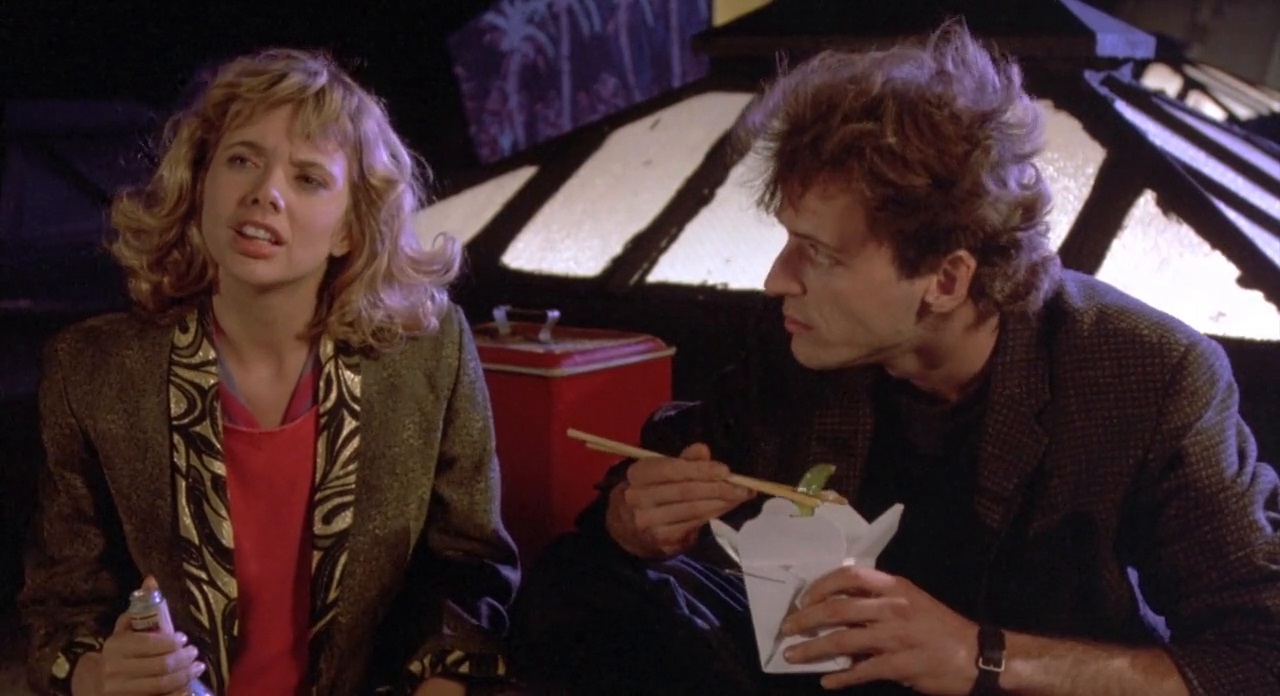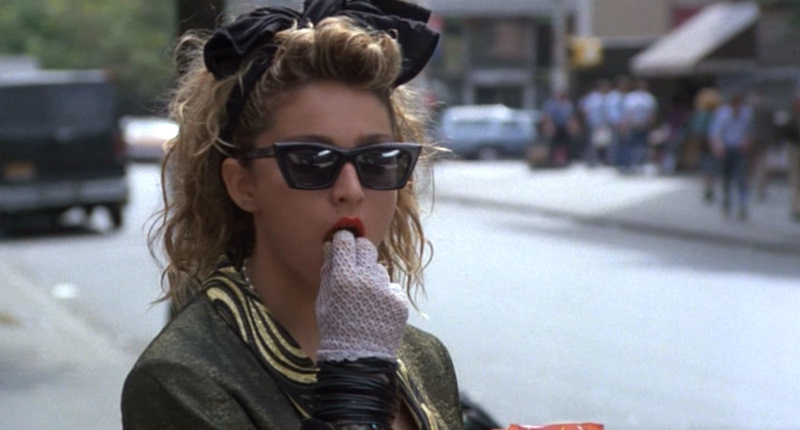This guest post written by Alex Kittle appears as part of our theme week on Women Directors.
It isn’t referenced much in any well-informed, critical film discussions. It isn’t typically put forth as a shining example of 80s cinema, or women-directed cinema, or Madonna-starring cinema. It probably isn’t used in many film classes. It isn’t especially well-remembered today, except as a kind of style footnote within the singer’s long and storied career. And yet, I would easily count Susan Seidelman’s Desperately Seeking Susan among my favorite films.
I remember the very first time I ever saw this movie. I was about 16, and I was home sick with a bad cold. I was in a fog all day but couldn’t sleep, so I hazily watched movies on cable TV all afternoon. Desperately Seeking Susan came on one of our movie channels and I immediately fell for its hip 80s New York world. I grew up in a boring suburb across the river from New York City, and easily imagined myself crossing the tunnel and joining a rock band and living a super-cool city life and having wild but sexy fashion sense when I got older. I especially romanticized the punk/new wave scene of the 70s and 80s, when there was graffiti everywhere and cool musicians hanging out on every corner, and young people could live in crumbling bohemian apartments and no one ever seemed to need a day job. I wanted to be an independent young woman who exuded confidence and had street smarts and wore red lipstick and could somehow eat a puffy cheeto without getting cheese dust all over her body. Instead, I was stuck in my small town with my awkward teen body and a personal style that took many more years to cultivate into anything I could be comfortable with.
Basically, I was a Roberta. And I wanted to be a Susan.
Combining wacky caper with romantic comedy and class satire, Desperately Seeking Susan is about a bored, lonely housewife named Roberta living in Fort Lee, NJ, who longs for something to spice up her cookie-cutter existence. She knows she’s desperate, but she’s not sure for what, she just has a vague feeling of dissatisfaction, of disconnection from her bland husband and yuppie friends. It takes a total movie-comedy moment (in the form of an amnesia-inducing bump on the head) to free her from the lifestyle she had fallen into; a large portion of the film is dedicated to her coming into herself and finding her personality. Being mistaken for Susan means she can model herself after Susan, or at least everyone’s image of Susan. Without her memories and without any connection to her real life, Roberta is suddenly able to do anything, and to be anybody, a thought which obviously excites her. She starts (and immediately quits) smoking, makes out with a near-stranger, learns to perform magic, dresses to kill, and foils a murderous criminal plot.
Madonna’s character Susan, on the other hand, is introduced as a sexy new wave nomad, breezing her way through relationships and hotel rooms across the country, presumably charming everyone she meets and never having to pay for anything herself. She wears mesh tops and chunky jewelry, her bold lipstick is never smudged, and she dates a cute boy in a rock band. She is effortlessly cool and fully self-assured, full of ideas and never ever boring. She struts around New York City without a care in the world, believing that everyone can come to her, and everything will work out the way she wants it to. She embodies the New York downtown scene of the early 80s, a movement Madonna herself was involved in before she catapulted to fame around the time of the film’s release, which gives her an authenticity that couldn’t be captured with an outsider actress. The character was created to be an icon, a model for Roberta and other women like her, an image to hold in our heads of what life could be like if we just unleashed our inner pop star. But she’s also real enough that it feels like you might spot her in a hip nightclub, dancing uninhibited and having more fun than anyone else there just because she’s being herself.
While not all of Roberta’s exploratory adventures actually suit her, she seems able to find a happy medium between her former good-natured housewife self and the wild-girl persona that was thrust upon her. And yes, part of that happens through finding love, real love that isn’t the watered-down marriage she’d been stuck in for four years. But the story isn’t about finding yourself through a man, or any relationship, it’s about finding yourself outside of those things. One of my favorite exchanges of the movie is towards the end when Roberta confronts her dopey (and hilariously terrible) husband, Gary, after he finally tracks her down to the club where she’s working as a magician’s assistant. “Look at me,” she says. His response is, “I looked at you, you look ridiculous.” “I mean, look at ME, Gary!” she implores. Her face and her inflection speak volumes, and it’s clear this is the most weight she has ever given to the word “me,” that this is the first time she really understands what the word means. And finally she asserts, “I’m not coming home with you.” It’s a really good moment.
I’m not saying Desperately Seeking Susan should be held up as some great, under-appreciated feminist text. I’m not saying Susan should be considered a role model, or that she served as mine specifically (for one thing, she smokes, so that’s a dealbreaker). What I am hoping for is a little respect. This film is primarily remembered for Madonna’s fashion and a string of musical cameos (John Lurie, Annie Golden, Richard Edson, Anne Magnuson, etc.), but it would be great if it was more often cited as what it is to me: A significant entry into the never-big-enough genre of empowering women’s stories. Because, as a former sick teen sitting at home on the couch, forever uncool and unsure, it was nice to watch Roberta becoming her own person for the first time, and to witness Susan just being Susan. It still is.
Alex Kittle is an artist, writer, retail buyer, and curator who lives and works in the Boston area. She is passionate about many things, including horror movies, 80s new wave, feminist art history, crossword puzzles, and science-fiction. You can find her at almost any given time of day hanging out on Twitter at @alexxkittle.



Well said, Desperately Seeking Susan is one of my favorite films too. Have you seen the original ending in which Alberta and Susan run off together?